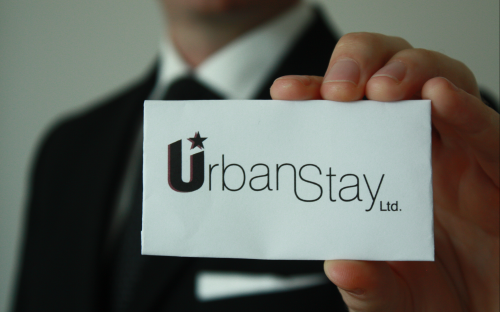The EDHEC Business School graduate, pictured right, co-founded Urban Stay, which offers temporary accommodation for corporate workers in the City of London.
He developed the idea as a project during EDHEC’s Entrepreneurship Track, which helps students explore ideas for new business ventures.
Urban Stay operates 20 serviced apartments between the City, London’s financial center, and trendy Notting Hill to the west, and it has 1,000 properties listed on its site that are offered through other companies it partners with.
James launched Urban Stay with his partner Jenny Dreiling, whom he met while backpacking in southeast Asia. The couple poured all of their savings into the venture, with help from James’ parents. The business has raised equity but declines to provide details. It has four employees.
James draws on his experience at Skyline Worldwide, a leader in temporary housing, which he helped build from the ground-up. Urban Stay was an opportunity to repeat that success on his own terms.
Prior to Skyline he spent a year in The Peace Corps, the international development organization, where he taught English to children in Kyrgyzstan, central Asia.
How did the idea for Urban Stay Limited come about and how has your career background helped the company’s foundation?
Urban Stay originated as a project for my Entrepreneurship Track at the end of my EDHEC MBA. Once I started to delve deeper into the numbers and actually write coherently about my experience in the industry, I realized that it was possible. I brought it up with my partner, Jenny, as we both wanted to move to London and start our lives together there (here). Her background was in finance with Amazon and mine was in business development in this industry.
Who is your target market and how have you tried to capture them?
Our target market is travel managers and global mobility managers within large, multinational companies. Relocation companies are a secondary target, and finally specific, serviced apartment booking agents are our third.
We capture business from all three currently via direct channels: building relationships person-to-person, networking, direct marketing, and personal introduction. It’s a hard job, but I put in the real work with Skyline years ago, so luckily I’ve been able to trade on my good reputation, heavily, to get started.
What prospects do you see for the so-called sharing economy that you operate in?
Serviced apartments are expected to only grow in popularity in the corporate world, so we’re well positioned to capitalize on this growth.
How has the EDHEC MBA benefited you and the company?
The EDHEC MBA was instrumental in my decision to start my own company, and my current success. It helped me especially in accounting, finance, HR, and marketing. The team dynamic of the EDHEC MBA was of paramount importance, as it taught me how to manage effectively all different types of people, and how important communication can be, and how to tailor it.
Mostly, moving to Nice and taking time away from my career gave me perspective, which I wouldn’t have enjoyed any other way. The Entrepreneurship Track especially was of the utmost importance in providing me with the necessary tools and confidence to pursue my own destiny.
What motivated you to volunteer in The Peace Corps?
I could continue to teach while living and experiencing a completely different culture in a part of the world I’d probably never see otherwise.
After a very long and intense application period I was accepted and sent to Kyrgyzstan where I lived with a local host-family, learned the language, and taught grade-school children English.
It was one of the most difficult and most rewarding experiences of my life. When that ended abruptly (it’s a much longer story than we have time for) and I was shuttled back to Seattle, I knew I couldn't go back to my old life. So I bought a one-way ticket to London and haven’t looked back since.
RECAPTHA :
a1
73
4f
ae











